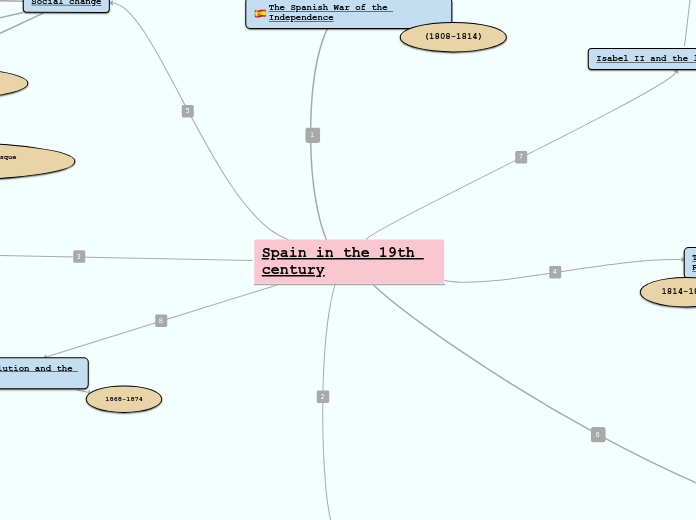Spain in the 19th century
The Parliament of Cádiz
Parliamentary legislation
Constitution of 1812
The first Spanish constitution
Passed reforms ended in the Old Regime
Freedom of the press, no more torture, equality of the citizien...
The Constitution of Cádiz / La Pepa
National sovereignty
Moderate hereditary monarchy
Separation of powers
Legisative
Executive
Judicial
Catholicism as the only religion in Spain
The Parliament of Cádiz
Juntas
Junta Central Suprema
Constituent Parliament
The Bourbon Restoration
Alfonso XII became king of Spain
1874
Establish stability after pronunciamientos and civil wars
Constitution of 1876
Social change
Isabel II and the liberals state
1833-1868
The 'Moderate Decade'
The Triumph of the Liberalism
1833-1844
Isabel II inherited the throne at 3 years
Regents
Moderates and unionists
The Progressive Biennum
The restoration of the Old Regime
The Restoration of the Old Regime
War between conservatives and liberals
Failed pronunciamientos (uprising) when army officials looked for a change of government
The liberals in power
1820-1823
The end of absolutism
1823-1833
1814-1833
The Glorious Revolution and the First Republic
1868-1874
The Glorious Revolution
The First Spanish Republic
Problems
The Cantonal Revolution
The Third Carlist War
Cuba
The Spanish War of the Independence
The end of the reign of Carlos V
Treaties, battles and important events
(1808-1814)
The War of Independence
Uprising on 2nd May 1808 in Madrid
Spanish Population
Fernandinos
Afrancesados
They recognised José I as a king
They were loyal to Fernando VII
The war between France and Spain
Up to late 1808
From 1812 to 1814
From late 1808 to 1812
This Constitution established several rights such as equality before the law, freedom of the press and the right of ownership
This is called "La Pepa" because this same day is the Father's day and the San José day, so they decided to called it with female terms
Mutiny of Aranjuez
March, 1808
Treaty of Fontaineblau
1807
Battle of Trafalgar
1805
Treaty of San Ildefonso
In 1796 and 1800
Charles VI abdicated in favour of Fernando VII and Fernando VII, in favour of Joseph Bonaparte
Parties of the Turno Pacífico
Led by Antonio Cánovas del Castillo
Supported the Church and the social order
Led by Práxedes Mateo Sagasta
In 1890 they established universal male suffrage
The liberals
The conservatives
This system brought stability to Spanish politics based on political manipulation
Caciquismo
Pucherazo
The king decided the party
Rural areas-Caciques-Intimidation-Violence
Cities-Caciques-Election results-Manipulated
The arrangement between conservatives/liberals prevented parties from participating in government
Socialists
Led by Pablo Iglesias and Catalan, Basque and Galician nationalists
Anarchists
19th March 1812
Demographic growth and emigration
The birth rate was still high
The death rate fell slighty because of improvements in health and hygiene
Society
The upper class: aristocracy and high bourgeoisie
The middle class: civil servants, lawyers, small business...
The lower class/working class: peasants and workers
Origins of the labour movement
Early Luddite demonstrations involved the destructions of machines and factories
The first workers' associations appeared. It demanded freedom of assembly
Anarchism
Socialism
Pablo Iglesias
Giuseppe Fanelli
Spanish section of the First International
The Federación Regional Española was created/FRE
Illegal in 1874
Spread rapidly in Valencia, Catalonia and Andalusia
In 1910, several anarchists groups founded and anarchist trade union, the Confederación Nacional del Trabajo
Partido Socialista Obrero Español/PSOE
A convention in Barcelona created the Unión General de Trabajadores/UGT
1888
Only strong in Madrid and in the Basque Country
Many people emigrated especially Argentina and Cuba because there were more jobs and more availables
Parties that favored the participation in policy
1814-1820
Fernando VII abolished the Constitution of 1812
Absolute Monarch
Absolutist period lasted for six years
1814-1820
Sexenio Absolutista
Colonel Rafael del Riego led a succesful liberal pronunciamiento
Three-year period , Trienio Liberal
The moderates
The radicals
1820
That brought back the Constitution of 1812
In favour of moderate reforms, it would be accepted by the elite/monarch
It pushed for more radical reforms and the full application of the Constitution of Cádiz
Constant conflict
Fiscal crisis
Political tensions
Dynastic succession
The Pragmatic Sanction (1830) changed the law in favour of Isabel bu many absolutists pereferred Carlos de Borbón
Treasury=no money. Loss of most of American colonies=matters worse
Liberals were persecuted by the monarchy
Fernando VII died in 1833
Carlos de Borbón proclaimed king himself
First Carlist War (1833-1840)
Between Carlos and Isabel (Fernando's daughter)
Liberals
Isabel
Carlists
Carlos de Borbón
1.
2.
They supported...
Liberals
Embrace of Vergara
Winners
They ended with a treaty
The Hundred Thousand Sons of Saint Louis
Holy Alliance sent a large army to Spain
1823
Second return of Fernando VII as an absolute monarch
The economy in 19th century in Spain
An agrarian society
Industry, the railway and finance
The cotton textil industry
The iron and steel industry
Transport
Banking
The Spanish Stock Exchange
Was there an Industrial Revolution in 19th century Spain?
The domestic market wasn't very well developed in Spain
Capital was scarce in Spain
Transport infrastructures
Energy sources
Coal was expensive and scarce
Spain had iron deposits
Part of Spain's iron production was especially exported to Britain
